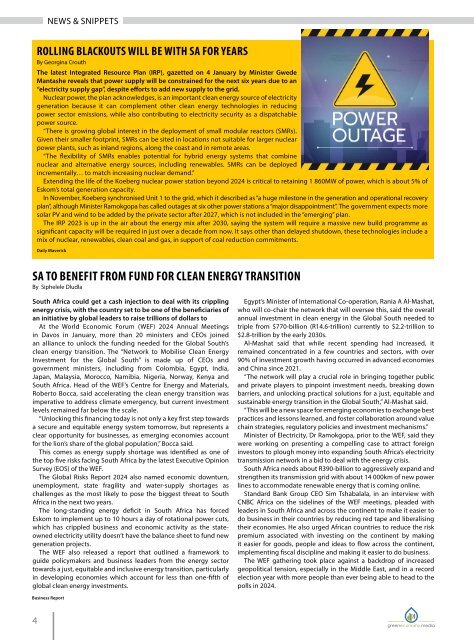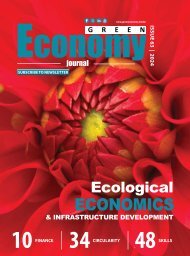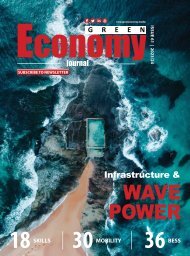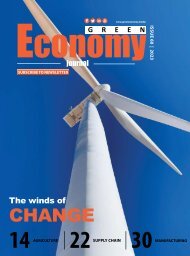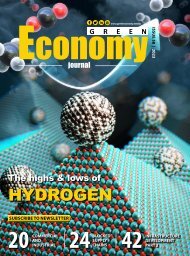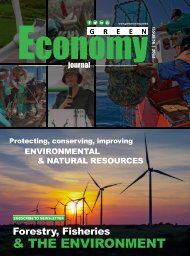Green Economy Journal Issue 62
Create successful ePaper yourself
Turn your PDF publications into a flip-book with our unique Google optimized e-Paper software.
NEWS & SNIPPETS<br />
ROLLING BLACKOUTS WILL BE WITH SA FOR YEARS<br />
By Georgina Crouth<br />
The latest Integrated Resource Plan (IRP), gazetted on 4 January by Minister Gwede<br />
Mantashe reveals that power supply will be constrained for the next six years due to an<br />
“electricity supply gap”, despite efforts to add new supply to the grid.<br />
Nuclear power, the plan acknowledges, is an important clean energy source of electricity<br />
generation because it can complement other clean energy technologies in reducing<br />
power sector emissions, while also contributing to electricity security as a dispatchable<br />
power source.<br />
“There is growing global interest in the deployment of small modular reactors (SMRs).<br />
Given their smaller footprint, SMRs can be sited in locations not suitable for larger nuclear<br />
power plants, such as inland regions, along the coast and in remote areas.<br />
“The flexibility of SMRs enables potential for hybrid energy systems that combine<br />
nuclear and alternative energy sources, including renewables. SMRs can be deployed<br />
incrementally… to match increasing nuclear demand.”<br />
Extending the life of the Koeberg nuclear power station beyond 2024 is critical to retaining 1 860MW of power, which is about 5% of<br />
Eskom’s total generation capacity.<br />
In November, Koeberg synchronised Unit 1 to the grid, which it described as “a huge milestone in the generation and operational recovery<br />
plan”, although Minister Ramokgopa has called outages at six other power stations a “major disappointment”. The government expects more<br />
solar PV and wind to be added by the private sector after 2027, which is not included in the “emerging” plan.<br />
The IRP 2023 is up in the air about the energy mix after 2030, saying the system will require a massive new build programme as<br />
significant capacity will be required in just over a decade from now. It says other than delayed shutdown, these technologies include a<br />
mix of nuclear, renewables, clean coal and gas, in support of coal reduction commitments.<br />
Daily Maverick<br />
SA TO BENEFIT FROM FUND FOR CLEAN ENERGY TRANSITION<br />
By Siphelele Dludla<br />
South Africa could get a cash injection to deal with its crippling<br />
energy crisis, with the country set to be one of the beneficiaries of<br />
an initiative by global leaders to raise trillions of dollars to<br />
At the World Economic Forum (WEF) 2024 Annual Meetings<br />
in Davos in January, more than 20 ministers and CEOs joined<br />
an alliance to unlock the funding needed for the Global South’s<br />
clean energy transition. The “Network to Mobilise Clean Energy<br />
Investment for the Global South” is made up of CEOs and<br />
government ministers, including from Colombia, Egypt, India,<br />
Japan, Malaysia, Morocco, Namibia, Nigeria, Norway, Kenya and<br />
South Africa. Head of the WEF’s Centre for Energy and Materials,<br />
Roberto Bocca, said accelerating the clean energy transition was<br />
imperative to address climate emergency, but current investment<br />
levels remained far below the scale.<br />
“Unlocking this financing today is not only a key first step towards<br />
a secure and equitable energy system tomorrow, but represents a<br />
clear opportunity for businesses, as emerging economies account<br />
for the lion’s share of the global population,” Bocca said.<br />
This comes as energy supply shortage was identified as one of<br />
the top five risks facing South Africa by the latest Executive Opinion<br />
Survey (EOS) of the WEF.<br />
The Global Risks Report 2024 also named economic downturn,<br />
unemployment, state fragility and water-supply shortages as<br />
challenges as the most likely to pose the biggest threat to South<br />
Africa in the next two years.<br />
The long-standing energy deficit in South Africa has forced<br />
Eskom to implement up to 10 hours a day of rotational power cuts,<br />
which has crippled business and economic activity as the stateowned<br />
electricity utility doesn’t have the balance sheet to fund new<br />
generation projects.<br />
The WEF also released a report that outlined a framework to<br />
guide policymakers and business leaders from the energy sector<br />
towards a just, equitable and inclusive energy transition, particularly<br />
in developing economies which account for less than one-fifth of<br />
global clean energy investments.<br />
Business Report<br />
Egypt’s Minister of International Co-operation, Rania A Al-Mashat,<br />
who will co-chair the network that will oversee this, said the overall<br />
annual investment in clean energy in the Global South needed to<br />
triple from $770-billion (R14.6-trillion) currently to $2.2-trillion to<br />
$2.8-trillion by the early 2030s.<br />
Al-Mashat said that while recent spending had increased, it<br />
remained concentrated in a few countries and sectors, with over<br />
90% of investment growth having occurred in advanced economies<br />
and China since 2021.<br />
“The network will play a crucial role in bringing together public<br />
and private players to pinpoint investment needs, breaking down<br />
barriers, and unlocking practical solutions for a just, equitable and<br />
sustainable energy transition in the Global South,” Al-Mashat said.<br />
“This will be a new space for emerging economies to exchange best<br />
practices and lessons learned, and foster collaboration around value<br />
chain strategies, regulatory policies and investment mechanisms.”<br />
Minister of Electricity, Dr Ramokgopa, prior to the WEF, said they<br />
were working on presenting a compelling case to attract foreign<br />
investors to plough money into expanding South Africa’s electricity<br />
transmission network in a bid to deal with the energy crisis.<br />
South Africa needs about R390-billion to aggressively expand and<br />
strengthen its transmission grid with about 14 000km of new power<br />
lines to accommodate renewable energy that is coming online.<br />
Standard Bank Group CEO Sim Tshabalala, in an interview with<br />
CNBC Africa on the sidelines of the WEF meetings, pleaded with<br />
leaders in South Africa and across the continent to make it easier to<br />
do business in their countries by reducing red tape and liberalising<br />
their economies. He also urged African countries to reduce the risk<br />
premium associated with investing on the continent by making<br />
it easier for goods, people and ideas to flow across the continent,<br />
implementing fiscal discipline and making it easier to do business.<br />
The WEF gathering took place against a backdrop of increased<br />
geopolitical tension, especially in the Middle East, and in a record<br />
election year with more people than ever being able to head to the<br />
polls in 2024.<br />
SCARCITY OF FUNDING IN THE MINING INDUSTRY<br />
By Rashaad Carrim and Shirleen Ritchie, partners at Webber Wentzel<br />
Understanding the role of mining companies in the global<br />
economy is crucial in navigating the many legal and economic<br />
hurdles to ensure that these companies continue to operate<br />
responsibly, sustainably and profitably. Accordingly, this sector<br />
operates in a complex legal landscape, characterised by<br />
evolving and increasingly stringent regulations, environmental<br />
considerations and community concerns while at the same time<br />
having to navigate the ever-present need and often scarcity<br />
of funding.<br />
ALTERNATIVE FUNDING OPTIONS<br />
Investors and third-party funders, such as banks and investment<br />
funds, are increasingly facing pressure to disinvest from the<br />
mining industry in favour of “greener” investment options. This is<br />
specifically present in those mining sectors that are perceived as<br />
being inescapably linked to fossil fuels (coal companies and the<br />
like). While there is still a diminishing bucket of investors who<br />
continue to invest in these entities, the equity and debt capital<br />
markets have insufficient will or depth to sustain the capital<br />
expenditure necessary to progress mining operations generally<br />
and for “out of favour” commodities. Furthermore, banks and<br />
funding institutions are similarly limiting their exposure to mining<br />
operations to such an extent that the leveraging options available<br />
to mining companies are presently few and far between.<br />
Newer (and in some cases revived) financing options have<br />
started emerging as viable sources, such as royalty arrangements<br />
and streaming together with blockchain and crowdfunding<br />
(particularly for smaller mining companies or projects with a strong<br />
social impact narrative). These innovative financing mechanisms<br />
offer greater access, flexibility and benefits to mining companies,<br />
including balance sheet optimisation, which in turn increases<br />
the ability to provide investors with real and meaningful returns<br />
using dividends.<br />
Royalty and streaming arrangements offer many unique advantages<br />
to mining companies. Streaming and royalty agreements are contracts<br />
concluded between the streamer (purchaser) and the mining<br />
REACTION TO DRAFT IRP 2023<br />
The draft IRP 2023 makes the case for a fossil-heavy electricity<br />
generation system on the basis of undisclosed and unsupported<br />
assumptions that are not replicable. It also does not consider<br />
the uncompetitive future to which this poorly drafted plan<br />
would bind the South African economy.<br />
“This is not only a step back for the Department of Mineral<br />
Resources and Energy (DMRE) in terms of consultation and clarity<br />
of work, it is a high-risk pitch for special interests at the cost of the<br />
citizens’ futures. We can and must do better,” says James Reeler,<br />
senior manager for Climate Action with WWF South Africa.<br />
Reeler describes the draft IRP as “not only disappointing, but<br />
it also seems to fly in the face of all other electricity generation<br />
models, both national and internationally”.<br />
“It would appear that the IRP’s conclusions are driven by<br />
a foregone conclusion that fossil gas and coal are necessary,<br />
with modelling constraints for different pathways constructed<br />
to support this. The result is a vision that proposes to increase<br />
greenhouse gas emissions and the concomitant health impacts<br />
of our energy system, at massive cost to human health and<br />
wellbeing,” he says.<br />
The IRP’s cost assumptions differ significantly from what has<br />
been seen in the real world, where renewable energy (RE) is<br />
now the cheapest form of energy that has ever been available.<br />
Moreover, the unwarranted assertion that large scale renewable<br />
NEWS & SNIPPETS<br />
company (seller) and can be efficiently<br />
implemented within a short space of time, as<br />
these arrangements usually do not require<br />
complex engagements with equity capital<br />
markets and shareholders. It also often allows<br />
mining companies to optimise the sale<br />
of non-core or secondary commodities<br />
using more competitive pricing. However,<br />
the allure of these avenues should be Shirleen Ritchie.<br />
balanced with an acute understanding<br />
of the regulatory, exchange control and tax<br />
implications as well as the overall cost of<br />
funding for the mining companies.<br />
In addition, many tax jurisdictions will<br />
tax the receipt of funds earned at corporate<br />
income tax rates, which would make royalty<br />
and streaming arrangements prohibitively<br />
expensive. Coupled with income tax are the<br />
often-present value-added taxes that need<br />
to be considered. South African tax laws, for<br />
example, would tax the receipt at corporate Rashaad Carrim.<br />
income tax rates but the application<br />
of certain smoothing provisions that allow the profit associated<br />
with streaming agree-ments to be recognised over the term of the<br />
agreement do offer solutions that make this viable. To this end,<br />
although commercial expediency and ease of implementation may<br />
be the first attraction, it is critically important to consider the legal<br />
and tax landscape of the mining company early in the negotiations or<br />
this will not yield the desired results.<br />
In this ever-changing world, the mining industry will continue<br />
to be tested, however, tapping into the power of these previously<br />
underutilised and novel sources of funding together with the<br />
guidance of strategic and experienced advisors is fast becoming<br />
a necessity for large, mid-tier and junior mining houses alike, to<br />
demonstrate to their stakeholders their continued ability to secure<br />
the ever-present need for capital and resilience in general.<br />
builds will necessarily result in large amounts of unserved energy<br />
is driven more by artificial constraints placed on the model than<br />
real feasibility assessment.<br />
The IRP’s near-term reliance on fossil gas to make up a<br />
shortfall in generation should not be construed to mean that<br />
exploitation of gas reserves is a viable option for the long term.<br />
The Intergovernmental Panel on Climate Change (IPCC) and<br />
International Energy Agency (IEA) are clear that to meet the global<br />
goal of limiting climate change to near 1.5°C the world cannot<br />
afford to make use of any additional fossil fuels.<br />
In addition, a legitimate economic assessment of the impacts<br />
of a high emissions pathway should also consider the additional<br />
effects of being unable to export products to key markets, as well<br />
as the additional climate and human health impacts. Delaying<br />
the shutdown of coal plants will violate any chance of South<br />
Africa meeting its international mitigation commitments; the low<br />
likelihood and very high cost of carbon capture and storage mean<br />
it is not a reasonable fix for continued operation of coal plants.<br />
Overall, WWF is extremely concerned that Cabinet has approved<br />
this document in its current state for public consultation and calls<br />
for better transparency and rigour in the development of such<br />
critical planning documents. It strongly urges that DMRE makes<br />
their assumptions and model workings clear, to enable proper<br />
assessment of their conclusions.<br />
4 5


